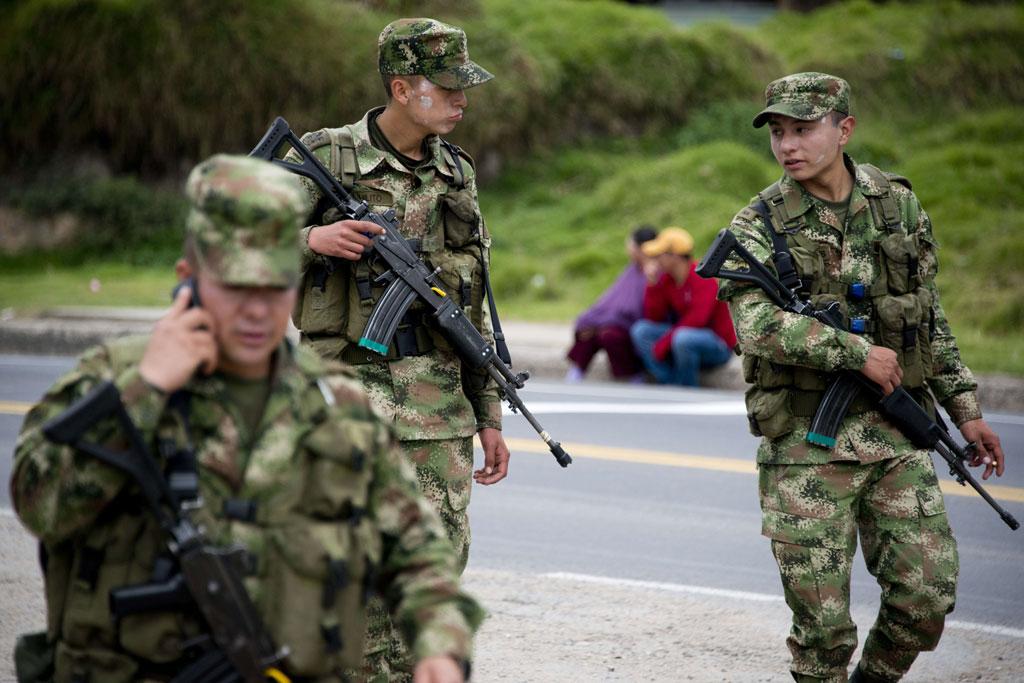Colombia’s farmer protests could disrupt President Santos’s re-election bid
Soldiers patrol the Bogota-Tunja highway in Colombia on the first day of a national strike by farmers protesting against the government for alleged unpaid benefits on April 28, 2014.
Farmers across Colombia began protests on Monday demanding the government enact reforms it promised last year, organizers said, demonstrations that could unsettle President Juan Manuel Santos as he runs for re-election in four weeks.
Colombian producers of coffee, potatoes, rice, tomatoes and other crops say the government has failed to alleviate indebtedness and regulate prices for inputs like fertilizer, among other measures, they say were promised in August to end protests back then that turned violent.
"We are complaining about the government not fulfilling the agreements of August last year," Victor Correa, spokesman for the Dignidad Cafetero coffee growers' protest movement told Reuters.
The government argues it has been making progress but that some reforms are long-term and has released a flurry of statements in recent days highlighting the attention it has been giving to the sector.
The Agriculture Minister Ruben Dario Lizarralde was scheduled to meet with representatives of the protesters early on Tuesday.
Nonetheless, protest organizers have called for more farmers to turn out for a second day, which could put more pressure on the government if the protests begin to disrupt public order.
The protests come at an awkward moment for Santos who is seeking a second four-year term in elections on May 25 as the demonstrations turn the spotlight on a sector that some believe has been neglected by the government.
Center-right Santos has said the protests are deliberately designed to damage his election campaign. If they escalate they could boost support for right-wing Oscar Ivan Zuluaga and the Green Alliance's Enrique Penalosa, his two main rivals.
Santos called on Monday for an end to the protests.
"I want to make a call today to all farmers and agrarian social organizations for us to work together … There are the resources, the political will and we have had dialogue like never before with the different sectors," he said.
Government accuses FARC
Santos's popularity plunged to a record low of 21 percent immediately following last year's protests from above 50 percent months earlier. A poll this weekend by Ipsos Napoleon Franco showed Santos would likely win the election but need a second round.
Interior Minister Aurelio Irragori said the protests were peaceful and the only attempt to block a road was in a large coffee-growing province.
"In the rest of the country there have been some demonstrations by different sectors, all peaceful and without roadblocks," he said.
Protest organizers deny government accusations that the FARC rebels are behind the movement, which they say has clear and legitimate aims. Nonetheless, the government said it has proof the rebels have been trying to incite farmers to take part.
The FARC, or Revolutionary Armed Forces of Colombia, have been engaged in peace talks with the government over the last 17 months in a bid to end a conflict that has stretched 50 years.
FARC negotiator Rodrigo Granda denied the group was involved but said it backed the protests in principle.
Last year's protests turned violent as the armed forces used tear gas to end road blockades that cut off food supplies to some towns. The protests culminated with demonstrations in a main square in the capital Bogota. Students joined the protests and smashed shop windows.
(Additional reporting by Monica Garcia; Editing by Cynthia Osterman, Chizu Nomiyama and Michael Perry)
Every day, reporters and producers at The World are hard at work bringing you human-centered news from across the globe. But we can’t do it without you. We need your support to ensure we can continue this work for another year.
Make a gift today, and you’ll help us unlock a matching gift of $67,000!
